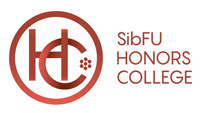
The mission of the SibFU Honors College is to inspire students to develop their creativity and to fulfill their potential.
The SibFU Honors College provides students with modern, alternative learning experience.
The Objectives of the SibFU Honors College:
- to attract and bring together talented and ambitious students;
- to provide the best students of the university with advanced educational experience;
- to provide each student with support to fulfill his/her potential;
- to help students understand the importance of education for their future life and career;
- to develop a curriculum and extracurricular activities which contributes to student’s self-actualization;
- to use the resources of the university for the benefit of students;
- to enhance competitiveness of the Siberian Federal University in attracting and retaining high-performing students;
- to improve the institution’s reputation and academic excellence.
The competences and skills to develop mastering the SibFU Honors College program:
- communication skills;
- teamwork;
- negotiation skills;
- leadership;
- critical thinking;
- ability to generate new ideas;
- conflict management skills;
- visual thinking;
- capacity for self-learning and self-development.
The courses of the SibFU Honors College are taught at the high level.
Characteristics of the faculty staff working with students of the SibFU Honors College:
- intention for self-improvement and self-learning;
- commitment to drive innovations in the learning space;
- potential for pedagogical creativity: developing new learning techniques, experimental academic programs, creative assignments;
- ability to take different teaching responsibilities and to provide individual approach to each student;
- capacity for effective teaching of well-prepared, talented, gifted and ambitious individuals, open for new knowledge;
- ability to provide students with help to fulfill their potential.
Head of SibFU Honors College
 Maria V. Tarasova, Ph. D., associate professor, Department of Cultural Studies, School for the Humanities
Maria V. Tarasova, Ph. D., associate professor, Department of Cultural Studies, School for the Humanities
e-mail: honorscollege [at] sfu-kras [dot] ru
Range of educational areas
- Effective communication: negotiating and debates
- Public speaking
- Visual thinking: theory and practice (course provided both in Russian and in English language)
Course description
- This course introduces the students to the strategies and tactics of the development of their visual thinking.
- The students learn to enhance their visual thinking abilities by studying works of visual art and other products of visual thinking.
- The course aims at the improvement of creativity, design skills, spatial intelligence, modeling and operating visual images.
Course objectives:
- to master the methods of improvement visual thinking skills;
- to obtain the skills of creation and implementation of ideas;
- to gain insight into the works of visual art as gnoseological and ontological acting models;
- to learn the theory and practice of creating products of visual thinking: models of scientific, professional and philosophic concepts.
- Individual psychology in organizational settings
- Academic networking in the international community (course provided both in Russian and in English language)
- Self-learning techniques
- Theory and practice of leadership
- Positive conflict resolution
- Critical thinking (course provided both in Russian and in English language)
- Theory of knowledge (course provided both in Russian and in English language)
- Homo Ludens (course provided both in Russian and in English language)
- Creative thinking
- Global issues (course provided both in Russian and in English language)
- Digital literacy (course provided both in Russian and in English language)
The methodology of the SibFU Honors College
The classes at the SibFU Honors College will be conducted in the format of:
- organizational-activity games,
- business games,
- learning games,
- discussions,
- debates;
- project-design;
- other forms of edutainment.
The concept of the organizational-activity game
- The concept of Organizational-Activity Games (OAG) was introduced in Russia by Georgiy Shchedrovitsky.
- The organizational-activity game is a special form and method for the organization of collective thinking and thinking activity.
- Games deal with complex problems (solving industrial and scientific problems, dealing with radical innovations, etc.).
- In education the objective of the Game is to develop and study new methods of teaching and learning in universities.
- The specific functions of the game depend on the type and nature of the thinking activity systems that adopt an organizational-activity game and use it for their own purposes.
- Various content may be embodied (represented, formalized, simulated) in a GAME because of its flexible form.
- Within the sphere of education, the game may serve as a method of teaching students.
- Within the sphere of the culture of technology, organizational-activity games may be used to obtain new examples, models, standards, and norms, and then to develop systems of culture on this basis;
- within the organizational and managerial sphere, OAG may be used to create new institutions;
- within the sphere of national research institutes, OAG may be used to create new projects and new research programs, to state and solve scientific problems.
Ivan Drobyshev, School of Economics, Management and Environmental Studies, SibFU
History of organizational activity games in Siberian Federal University traces back to mid-eighties. Although the OAG method was already known and used (however, not widespread, especially in higher education), some of these games were conducted as an experiment on whether it was possible to solve educational problems with the help of it. As we mentioned earlier, the “classic” OAGs were meant to create a collaborative environment that helps developing solutions to real-world problem situations in professional area. In those years, a huge discussion had been taking place in both academic and educational communities about new challenges that transitional economy (at the time of Perestroika in the USSR) and industry set for higher education. At 1986, the game named “Forms and means of professional training a new type of specialists in a modern university” organized at the university (Krasnoyarsk State University at that time) was one of the ways to address these issues. The other game of the same year set the educational professionalism of junior faculty staff as the main topic.
Other games had more field-specific topics. Several OAGs were dedicated to the advancing and applying the theory of Davydov and Elconin about developing education in practice. One of major results of these games was an idea that developing school environment required not only specific professional training of teachers, but also intensive everyday collaboration of a teaching staff and educational psychologists. It was presumed, that a school needed this approach it in order to take into account general and individual peculiarities of students (e.g. current competences and capabilities) and to plan specific learning activities accordingly. Also, this theory led to the idea of specific training for educational psychologists. That became a topic of series of games in 1985-1988, during which a project of the Faculty of Psychology in the university was developed. In 1988 first students enrolled for the “Developmental Psychology” program.
So, due to the fact that the Faculty and its “ideology” were born during organizational activity games, since then the format of these games has been used on a regular basis. The format was adapted to meet educational goals. The focus was deliberately shifted from real-world industry and production problems to the topic of professional self-determination of students. The vast majority of the students were yesterday high school graduates and had no professional background and, therefore, no solid grounds for real professional self-determination. So, all students went through two games as participants: during their first and second years of college. The game for first-year students set an aim to clarify their educational intentions (if there were any) and to help them set preliminary goals for their educational. The game for second-year students was traditionally (and informally) called “Building the Faculty of Psychology”. It was intended to address several questions. Do these junior students have the grounds to undertake responsible activities in academic environment? Do they have intentions and resources to take part in professional community? Can we (game organizers) perform a game action that can reveal or provide these resources to them? These questions clearly show that each game with students had both diagnostic and developing functions. Every game provided qualitative data on current students (although, sometimes it was hard to formalize the data), so the faculty staff, who also participated, after reflection and discussions on the game process and outcomes, could evaluate the efficiency of educational process. Does it meet the objectives of the Faculty? Is there a demand (from practice, professional community, labor markets) to reconsider the objectives and the way educational process is organized and carried out?
Nowadays, the Faculty of Psychology does not provide these games for students. The idea of Organizational games with students resides in School of Economics, Management and Environmental Studies. First year master’s students take a course called “Techniques of Self-Determination and Self-Development Under Conditions of Uncertainty”. The way the problem of self-determination is raised and brought to one’s concern by the course is surely not expressed in any textbook (at least, in Russian textbooks). The course itself is conducted as the organizational game with master’s students, and the thematic topic of each game is planned to create the mentioned conditions of uncertainty. The following communication and interaction among students altogether with the game masters is managed in the way, that main steps of the game display one of possible techniques to make the uncertain situation more clear and defined. The way of the game organization is a pattern to overcome this uncertainty.
There is a game for a specific master’s program called “Conflict management”. Master’s students participate in organizational game, which basically has the same objectives as the games of the Faculty of Psychology mentioned earlier. Who are students enrolled for the program? What are their intentions for the education? What aims are they pursuing by enrolling? Are they their driven by interests and needs of professional or personal nature? How can the program contribute to them, and how can they contribute to both the program and a school of thought (called Psychology of Constructive Conflict) that lies at the core? How should the educational process and interactions (both educational and professional) between students and the faculty be conducted? These questions, of course, cannot be answered within one game, and other steps are to be taken to make them clearer. However, the game is a start for all the parties to work on these questions, and the means to adjust this partly informal approach with formal academic schedule.
The organizational-activity games at the SibFU Honors College
- Series of organizational-activity games develop the learning process at the SibFU Honors College.
- Introductory game. The purpose of the introductory macro-OAG is the development of new forms of teaching and learning at the SibFU Honors College.
- The function of OAG I: to involve students and faculty stuff into the process of collective learning in the new institution of the Honors College.
Series of HC subject-oriented games. The games organized by the coach in each learning direction. The purpose of the micro-OAG is to develop new forms of knowledge in every sphere of learning.
E.g., Games for Negotiations, Games for Visualization, Games for Self-determination.
- HC summary games. The purpose of the final OAG in each semester is the study the results of learning and to develop new forms of teaching and learning at the SibFU Honors College during the next semester.
To enroll to SibFU Honors College a student has to sumbit the following documents:
- application (.doc);
- Curriculum Vitae (.doc);
- a scanned copy of his/her student's record book;
- motivation letter (.doc).
The documents should be submitted to honorscollege [at] sfu-kras [dot] ru.
Head of SibFU Honors College
 Maria V. Tarasova, Ph. D., associate professor, Department of Cultural Studies, School for the Humanities
Maria V. Tarasova, Ph. D., associate professor, Department of Cultural Studies, School for the Humanities

 Siberian Federal University
Siberian Federal University 
